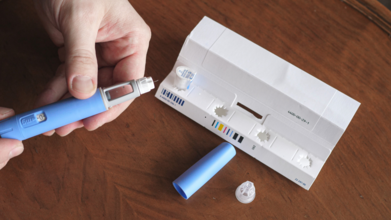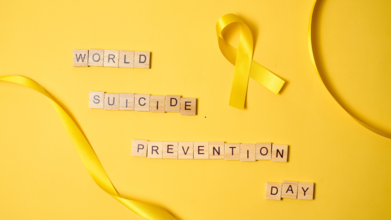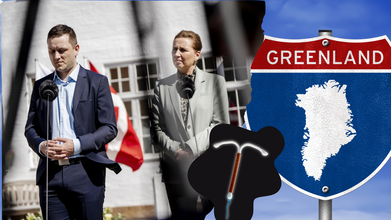- Health Conditions A-Z
- Health & Wellness
- Nutrition
- Fitness
- Health News
- Ayurveda
- Videos
- Medicine A-Z
- Parenting
- Web Stories
World Sleep Day 2025: Theme, Significance And History

Credits: Canva
To maintain good health rest is important. As a kid we slept a lot, however, as we grew old, our sleeping schedules changed. We now spend more time on our screens and find it difficult to get the 6 to 8 hour recommended sleep. Moreover, issues like sleep apnea, or sleep paralysis, insomnia, and many more can be experienced. This leaves the brain and body tired. This is why it is important to bring the attention back to the importance of sleep.
Thus since 2008, each year on Friday before the Spring Vernal Equinox, World Sleep Day is observed to highlight the importance of sleep for health and well-being. It is a call to action that focuses on the problems related to sleep. This also includes medicine education, social aspects and other. The day is organized by the World Sleep Society that aims to lessen the burden of sleep problems on society through better prevention and management of sleep disorders. Each year, World Sleep day thus aims to bring attention on the different aspects and benefits of good sleep health through its theme.
The History of World Sleep Day
The history can be dated back to 2008. World Sleep Day is observed annually on the Friday before the Spring Vernal Equinox, usually in mid-March. It aims to raise awareness about sleep issues and their impact on health while promoting better sleep habits. The event highlights various sleep disorders and available treatments. The chosen date aligns with the equinox, symbolizing the need for a balanced sleep routine, just as day and night are in harmony during this time.
Theme Of World Sleep Day 2025
This year's theme is 'Make Sleep Health a Priority'.
It is an opportunity to promote sleep health alongside thousands of other sleep health professionals and advocates. Last year, the theme was 'Sleep Equity for Global Health', which aimed to point out the vital role of sleep in overall health and drew attention to disparities in sleep health across various population.
What Is the significance of this day?
Sleepless can cause life-threatening issues such cardiovascular disease and lower level of blood-oxygen levels.
What Happens When Your Do Not Rest Properly?
Sleep is Essential for Your Health
Even missing one night of sleep can put stress on your body. Nighttime sleep is irreplaceable, and getting enough rest plays a crucial role in overall health.
Lack of Sleep Affects Your Daily Life
Have you ever had a restless night and felt exhausted the next day? Poor sleep can leave you feeling overwhelmed, unfocused, and drained. A good night’s rest ensures you wake up refreshed and ready to take on the day.
Sleep Deprivation Can Lead to Weight Gain
When you don’t get enough sleep, your body struggles to recover. This can lead to cravings for unhealthy foods, increasing the risk of weight gain over time.
Poor Sleep Increases Stress and Health Risks
Chronic sleep deprivation can lead to serious health issues, including stress, anxiety, and depression. It can also contribute to high blood pressure, irregular heartbeat, a weakened immune system, and hormonal imbalances.
You can’t fully make up for lost sleep during the day. Prioritizing a consistent sleep schedule is key to maintaining both physical and mental well-being.
Is Ozempic Really Safe? Health Canada Logs Nearly 12,000 Side Secondary Effect Cases

Credits: Canva
Canada’s leading drug regulator is facing a growing wave of concern over the popular diabetes and weight-loss medication Ozempic, after thousands of reports of adverse effects, some of them being severe, were recorded nationwide.
A Surge in Reports
Health Canada confirmed it has received 11,707 individual reports of adverse reactions linked to drugs containing semaglutide, including Ozempic, Rybelsus, and Wegovy, since their introduction to the Canadian market seven years ago.
The agency has collected 2,706 separate reports detailing these side effects, about half coming from health professionals and half from patients, according to data obtained by Le Journal de Montréal.
Also Read: World Suicide Prevention Day 2025: Theme, History, And Significance
The reported issues range from relatively mild gastrointestinal discomfort to severe events such as poisoning, vision loss, and psychiatric disorders. Gastrointestinal complaints alone account for one-third of the reports — highlighting how common nausea, vomiting, and constipation are among users.
Patients Speak Out
For patients like Liliana Mejia, the experience was devastating.
“It was horrible,” she told Le Journal. “Everything made me want to vomit, my vision was blurred, [I was] tired and constipated for 10 days.”
She stopped using the drug after a little over a year but says she wishes she had been warned about the potential impact earlier. “I don’t think we talk about it enough,” Mejia added.
Her story mirrors that of many Canadians now speaking out about their struggles.
Powerful But Not Risk-Free
Ozempic was originally designed as a treatment for type 2 diabetes but has skyrocketed in popularity due to its ability to suppress appetite, leading to rapid weight loss.
“It’s a powerful and effective drug that has many benefits, but also side effects that need to be managed,” explained Dr. Rémi Rabasa-Lhoret, endocrinologist and researcher, in comments to Le Journal.
He emphasized that the reports do not necessarily prove a direct cause-and-effect relationship between Ozempic and the complications, but said that listening to patients is crucial. “It requires proper medical monitoring,” he noted, stressing that it should not be used casually or without supervision.
Psychiatric Concerns and Risky Trends
Among the most worrying findings are the psychiatric problems reported by patients, 470 cases have been logged so far. Dr. Rabasa-Lhoret said he has seen patients spiral into eating disorders such as anorexia due to overuse of the drug.
He also pointed to the unprecedented demand for Ozempic, comparing the craze to the hype around Viagra when it first launched. “Many people have started prescribing it without providing proper support to patients,” he lamented, adding that the rise of online pharmacies has made it dangerously easy to obtain the drug without adequate oversight.
Vision Loss and Rare Neuropathies
One of the most troubling side effects being investigated is non-arteritic anterior ischemic optic neuropathy (NAION), a rare condition that can lead to permanent vision loss.
Jacques Pépin, 69, of Repentigny, Quebec, believes Ozempic played a role in the two strokes he suffered in his eyes over the past year.
“I wouldn’t have taken it if I had known,” Pépin told Le Journal.
He has now lost much of his sight and says he can no longer drive, read, or enjoy his favorite hobby — building model airplanes. “I break glasses, I have no balance,” he said, describing how the vision loss has upended his life.
Health Canada has logged 10 cases of NAION and is currently “reviewing relevant preliminary information on the potential risk.” Novo Nordisk, the drug’s manufacturer, denies a causal link, though its European labels are being updated to include NAION as a potential adverse reaction.
Balancing Benefits and Risks
Despite the concerning data, experts caution against panic. Sherbrooke endocrinologist Dr. André Carpentier told Le Journal that while the list of side effects can seem alarming, the drug’s benefits, from controlling diabetes to protecting heart and kidney health, are significant and must be weighed carefully against the risks.
“The link with Ozempic is difficult to establish beyond doubt,” Dr. Carpentier said, noting that certain complications, like sudden drops in blood sugar, can themselves trigger issues like vision problems.
Health Canada continues to collect and analyze data, and experts stress that the key is proper prescription, patient education, and close monitoring. For patients like Mejia and Pépin, however, the damage is already done, and their stories are sparking calls for more transparency about what users can expect before starting these medications.
World Suicide Prevention Day 2025: Theme, History, And Significance

Credits: Canva
Every year on 10th of September the world observes World Suicide Prevention Day. The day is organized by the International Association for Suicide Prevention (IASP) to raise awareness around the globe that suicide can be prevented.
As per the World Health Organization (WHO), more than 720,000 people die due to suicide every year and it is the third-leading cause of death among 15-29-year-olds. The WHO also provides that 73% of the global suicides occur in low-and-middle-income countries. The reasons are influenced by social, cultural, biological, psychological, and environmental factors present. As per the World Population Review's 2021 report the five countries with highest suicide rates are:
- Greenland at 59.6 per 100k population
- Guyana at 31.3 per 100k population
- Lithuania at 27.9 per 100k population
- South Korea at 25.8 per 100k population
- Russia at 24.1 per 100k population
World Suicide Prevention Day 2025 Theme
The triennial theme for 2024-2026, "Changing the Narrative on Suicide", with the call to action "Start the Conversation", reflects a significant shift in how society approaches suicide. Historically, suicide has been shrouded in silence, stigma, and fear. The goal now is to transform this narrative by encouraging open, honest discussions about mental health, suicide prevention, and the factors that contribute to suicidal thoughts and behaviors.
Also Read: Is Ozempic Really Safe? Health Canada Logs Nearly 12,000 Side Secondary Effect Cases
Starting conversations, whether at home, in schools, or workplaces, we can create a supportive culture that reduces the stigma attached to mental health. Changing the narrative is also about advocating for policies that prioritize mental health, increasing access to care, and ensuring that support systems are in place for those in need. This year's theme underscores that everyone, regardless of their role, can contribute to preventing suicides simply by being willing to listen and engage in meaningful discussions.
In recent years, the conversation surrounding suicide has expanded to include a wide array of contributing factors. Issues such as relationship troubles, financial difficulties, business failures, mental health disorders, substance abuse, and health problems are frequently associated with suicidal behaviors. However, an alarming trend has emerged: an increase in suicidal thoughts among school-aged children.
The pressures placed on children, especially in academic environments, are often a significant source of mental stress. As societal expectations on performance grow, children are left grappling with overwhelming anxiety, fear of failure, and a lack of emotional outlets to express their struggles. Suicide prevention efforts must focus on this vulnerable group, ensuring they receive the emotional and psychological support they need to cope with life’s challenges.
Suicide Prevention Day Origin And Significance
Established in 2003 by the ASP in collaboration with the WHO, World Suicide Prevention Day seeks to raise global awareness around suicide and its prevention. This annual event provides a platform to discuss strategies to reduce suicide rates, challenge misconceptions, and advocate for better mental health care.
The day’s significance lies in its mission to mobilize governments, communities, and individuals to confront the often-taboo subject of suicide. By bringing suicide prevention into public discourse, the aim is to foster a more understanding and supportive society, where mental health challenges are treated with the same urgency as physical illnesses. With each passing year, World Suicide Prevention Day serves as a call to action to break down the barriers that prevent people from seeking help when they need it most.
What Role Do We As A Society Play To Prevent Suicides?
Parents play a crucial role in suicide prevention, particularly when it comes to safeguarding the mental health of their children. Creating an open and communicative home environment where children feel comfortable expressing their emotions is essential. Harsh criticism or unrealistic academic expectations can exacerbate mental health struggles, making it imperative for parents to approach setbacks with empathy and encouragement.
Parents should also monitor their child’s daily routines, such as their diet, sleep patterns, and study habits, as these can significantly impact their emotional well-being. By ensuring a balanced and supportive lifestyle, parents can help mitigate the risks of suicidal thoughts.
Communities and educators also have a responsibility in preventing suicides. Schools should implement programs that teach children about emotional intelligence, stress management, and coping mechanisms for failure. Involving mental health professionals in schools to provide guidance and support can be a critical step in early intervention.
Changing the narrative on suicide also requires systemic change, particularly in how mental health is addressed by policymakers. Governments must prioritize mental health in their agendas, ensuring that comprehensive mental health services are accessible to all, regardless of socioeconomic status. Suicide prevention policies should focus on improving access to mental health care, increasing funding for suicide prevention programs, and supporting research on mental health issues.
Policymakers should also focus on improving mental health education, both in schools and workplaces, to foster environments where individuals feel comfortable seeking help. Suicide prevention is not just an individual responsibility but a societal one, where all stakeholders, from governments to local communities, must work together to save lives.
Not Just The Parenting Competency Test, Hundreds Of Greenlandic Girls Were Forcibly Given Contraception, Report Reveals

Credits: Health and me
An independent investigation has exposed a disturbing chapter in Greenlandic history, revealing that more than 350 Indigenous women and girls were forcibly given contraception by Danish authorities between the 1960s and mid-1970s. Some victims were as young as 12 years old. These findings highlight a legacy of systemic discrimination, control, and violations of human rights with far-reaching physical and psychological consequences.
The investigation revealed that the victims were either fitted with intrauterine devices (IUDs) or administered hormonal birth control shots without sufficient information or consent. The survivors reported agonizing side effects such as infections, bleeding, and long-term trauma.
Although the investigation concentrated on 354 women, Danish authorities estimate that over 4,000 women—approximately half of Greenlandic women of reproductive age at the time—were involved. The operations were performed under cover of public health policy, designed to restrict population growth as better healthcare and living standards produced a corresponding surge in births.
Nearly 150 Inuit women filed lawsuits against Denmark last year, claiming violations of human rights, with compensation claims still ongoing.
Centuries of Colonial Control and Dehumanizing Policies
The forced contraception program was part of broader Danish policies that dehumanized Greenlandic Indigenous populations. These policies included removing Inuit children from their parents for re-education in Danish foster homes and the controversial parenting competency test, known as the FKU.
Greenland was a Danish province in 1953, became home-ruled in 1979, and gained self-government in 2009. Though political development was made, the effects of such interventions persist among families and communities. Contraception and biased measurements such as the FKU were instruments of authority that disregarded Greenlandic culture and contravened international human rights conventions.
What Was the Danish Parenting Competency Test?
The FKU, or the forældrekompetenceundersøgelse, was a psychometric test aimed at determining if parents were fit to raise their children. Even though the test was meant to safeguard the children, it disproportionately affected the Greenlandic families.
Global human rights agencies, such as the Danish Institute for Human Rights and the UN Special Rapporteur on the Rights of Indigenous Peoples, condemned the test on grounds of cultural insensitivity. They stated that the FKU contravened Denmark's obligations under conventions such as ILO Convention No. 169, which binds states to uphold Indigenous cultural identity.
The test was formally dropped in January 2025 following decades of lobbying by human rights organizations, Greenlandic governments, and Indigenous lobby groups.
What Were The Findings of the Independent Investigation on Greenlandic Women?
The research gathered testimonies from 48 to 89-year-old women during the time of interviews. The majority of victims ranged between 12 and 37 years old when they were forcedly contracepted. A single girl was below 12 years, although her identity was not disclosed to ensure her privacy.
The victims also experienced physical and psychological trauma, such as chronic pain and infections, to helplessness and shame. The practices, conducted without informed consent, are deemed a blatant disregard for human rights.
Danish Government Responses and Apologies
In a bid to clear the scandal before the report was published, Denmark and Greenland governments jointly apologized last month. Children's Minister of Greenland Dr. Aqqaluaq B. Egede termed the apology as a "late but necessary measure," highlighting the need to stop further damage.
There is an official apology ceremony planned for September 24 in Nuuk, Greenland, and the purpose of which is to recognize wrongs of the past and to start a road towards reparation.
How These Issues Impacted Greenlandic Women's Mental Health?
The trauma of forced contraception and discriminatory parenting tests has left a lasting impact on Greenlandic women's mental health across generations. Survivors indicate high levels of anxiety, depression, and post-traumatic stress, frequently associated with shame, loss of autonomy, and betrayal by state institutions. Body image disturbance and reproductive anxieties were widespread, with many women fearing future pregnancy or medical procedures.
The psychological weight is felt beyond the direct victims. Families and communities have cited intergenerational trauma, with the younger generations learning mistrust of healthcare professionals and government institutions. Mental health practitioners in Greenland have pointed out that decades of systematic abuses have led to chronic stress, loneliness, and inability to develop secure family attachments.
Dr. Aqqaluaq recognized the deep psychological effects, saying, "The damage inflicted was not just physical—it has left deep emotional wounds that last for decades. It requires long-term mental health care, culturally appropriate counseling, and recognition of historical injustices.
It is argued by experts that mental health programs need to integrate trauma-informed care specific to the cultural and social environment of Greenlandic Indigenous women. It is only through ongoing support and acknowledgment of these past injustices that communities can start healing from the lasting effects of forced contraception and discriminatory parental evaluations.
For Greenland, this inquiry is a step in the direction of recognizing past injustices, maintaining Indigenous rights, and guaranteeing no future generations of Greenlanders will experience similar abuses. It also draws attention to the urgent need for worldwide consciousness of reproductive justice, cultural awareness, and long-term implications of human rights violations.
© 2024 Bennett, Coleman & Company Limited

